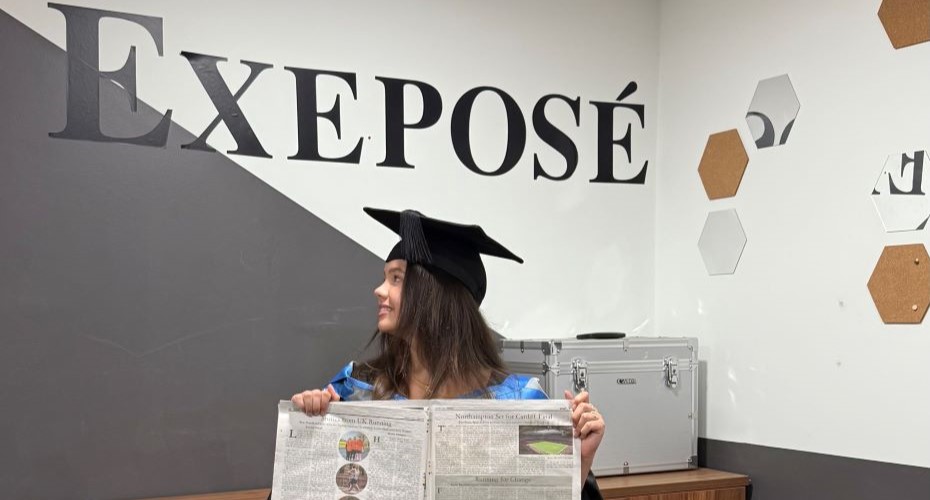Hi Everyone! I’m Eloise, a now graduate from the University of Exeter! Over the past three years I have been on a Flexible Combined Honours course studying BA Film and Television Studies and Geography. I was based on the Streatham Campus, but I am originally from Sussex.
At this time of the year, many students are receiving offers from universities or applying via Clearing. Some of you may still be at school and just beginning your university journey by searching courses and different institutions. It may have been a while ago now since I was first considering university, but I remember sifting through numerous webpages and attending various career events at my college and thinking – what can I really get out of a degree? Is it just going to be another qualification to add to my CV? Or will it be an enriching time in its own right? Well, now that I have completed my degree, I can confidently say it was the latter!
University is so much more than obtaining a certificate. There is so much to delve into about both the academic and non-academic value of a degree, so, in this blog, I’ll take you through some of the unique opportunities, experiences and skills that a degree from the University of Exeter can provide you with!
The academic side
The University of Exeter is a Russell Group university, which means it is very research-led. Lots of our academics are at the cutting edge of their respective fields; between teaching on their modules, these experts undertake research to widen the knowledge of their discipline… and then this all gets fed back to students! It is really exciting to be engaging with the people who publish books and write reports on the subject you find interesting and are studying. We get to access thousands upon thousands of texts online and in the library, but more importantly, we have access to the very latest research.
For example, in the Geography department, we have several academics who research the cryosphere (the ice-covered parts of our planet). Once they return from their fieldtrips – which take them from Peru to the Himalayas – they are able to reveal their findings to us in seminars and lectures.
Some students may even get the chance to help out their academics with their research, such as becoming an intern on a research project to help go through literature or analyse data collections, which is great for those who are particularly interested in undertaking research themselves and may consider a PhD later on in their academic career.
Our facilities at the University of Exeter are also state of the art and like no other. Take my Film and Television degree for example… we have an on-campus cinema museum (The Bill Douglas Cinema Museum) which is home to over 80,000 artefacts to do with the moving image and film paraphernalia – the biggest film-related archive in the UK outside the BFI (British Film Institute)!
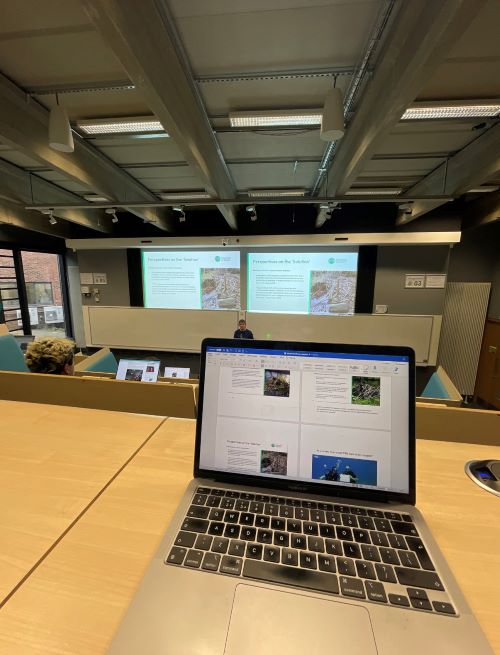
This is open to all students to view, but Film and Television studies students get hands on experience with these artefacts. We often have seminars in the museum itself, walk through the exhibitions, and interact with the displays.
The University of Exeter prides itself on having outstanding academics and facilities, and this has been recognised nationally and worldwide; the Complete University Guide ranked the University 11th in the UK overall, but we are also recognised for individual subjects too! For example, we have the largest collection of Middle Eastern texts in the UK, situated in the Institute for Arab and Islamic Studies. The Business School has previously been awarded Times Higher Education Business School of the Year, and our Ecology programmes are in fourth spot globally in the Shanghai Rankings subject rankings. Whilst these may just seem like amazing accolades, for students, they really show how the University is excelling across a variety of disciplines and faculties. Whatever subject you choose to study here, you’ll be surrounded by a wealth of knowledge and spaces to explore it.
Building a degree to suit you
Normally, school environments tell you what you need to study, often with little wiggle room to explore topics that you are interested in. But at university, the opposite is the case, especially at the University of Exeter.
Creativity and flexibility are encouraged even when it comes to the make-up of your degree. Of course, Exeter has single honours degrees, whereby you study a single subject – so if, for example, History is your favourite subject and you are intrigued to study it at degree level, go for it!
For some, whittling down from multiple A-Levels to a single honours degree may be a challenge – it certainly was for me! After taking four A-Levels ranging from the arts, to the humanities, and languages, I was struggling to decide which way to go, and to know which subject pulled me harder. It was particularly challenging when the two subjects I was most interested in (Film and Television studies and Geography) were in completely separate faculties, so UCAS applications seemed almost impossible.
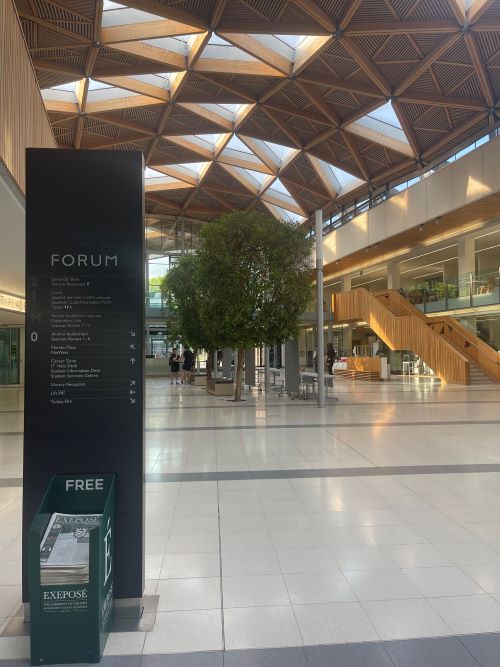
I was pretty set on coming to the University of Exeter after visiting the campus. The green spaces sprawling in every direction and the campus set up rather than a city university were both major pull factors influencing my decision to come here over any other university. But what also stood out to me was the University’s openness to flexibility. At least when I was researching back in 2022, no other university offered the variety within a degree that the University of Exeter did.
Many courses already exist at Exeter as combined honours, where you can take two subjects that go well together, such as English and Drama. But the University also offers a Flexible Combined Honours course (FCH). This allows students to combine two – sometimes up to three – subjects (although the third is often a language) together, that often spread across different disciplines.
For me, this was a dream come true. I could combine Film and Television, which is in the faculty of Humanities, Arts and Social Sciences (HASS) with Geography, which is part of the faculty of Environment, Science and Economy (ESE). The degree allowed me to split my timetable evenly between the two disciplines and saved me the massive headache of trying to choose which course I prefer slightly more than the other – after completing a degree in both of them, I still say that I love them both equally as much!
FCH can be great for the indecisive like me, as it can cater to those who have a passion for multiple subjects. It can also satisfy the hunger for a broader learning style. I definitely feel like my degree has made me an incredibly well-rounded person, able to find the facts and statistics (a gift from Geography) whilst also trying to find the hidden meaning and wider impacts of things (a gift from Film and Television studies).
But like I said, if you are set on a single subject and are keen to crack on, then that is great too and the University of Exeter has a seemingly endless list of single honours subjects!
If you choose to do a single honours degree but do find you’d like to dabble in another discipline from time to time, then the University of Exeter allows you to do so. Most single honours courses allow for something called modularity – this is where you can take a module each year outside your discipline. Going back to that History example from earlier, if you wanted to pick up a language, such as German, you could do so! These modules still count towards your degree and will be listed in your final transcript.
However, if you do enough modules, in this case in German, you could have your degree title altered to read ‘History with a proficiency in German’, making your classification unique, eye-catching to employers and arguably very cool!
Of course, each discipline will have variations on the amount of flexibility it can offer with modularity, and not every subject can offer just a single module to take, but it is something worth considering once you arrive and select your modules.
The value of sports, societies and the University community
One of the big differences between school / college and university is likely to be your timetable. At university there won’t necessarily be classes filling up your weekday schedule: often it’s rather to the contrary, to encourage independent study. Contact hours (the time you spend attending lectures, seminars, workshops and tutorials) vary between subjects and their own requirements, but typically each module on your course will have around 1-2 lectures a week plus a 2-3hr seminar and practicals / labs if relevant, and usually you take multiple modules per semester.
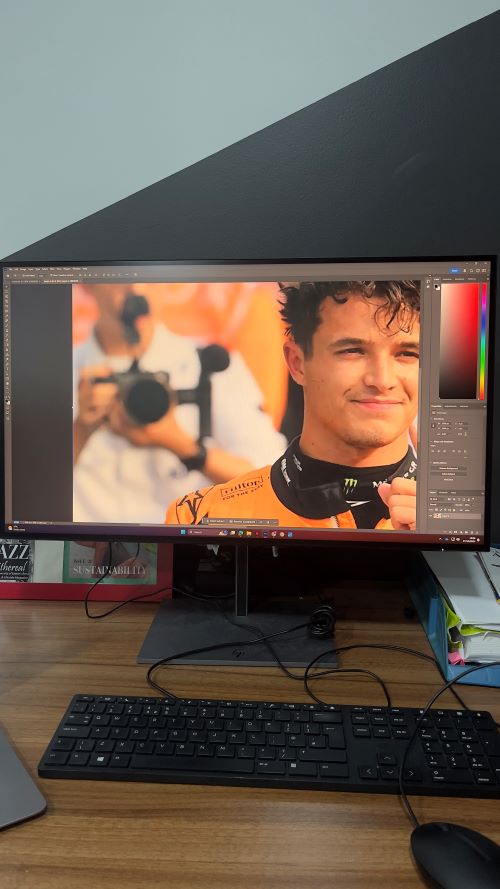
In Film and Television studies for example, I’d tend to have two one-hour lectures, two two-hour seminars, and four hours of film screenings a week, with a workshop dotted here and there to help with assignments. Geography, by contrast, only has two lots of one-hour lectures per module. So, as you can see, between courses, there is a lot of variation, but one thing is for sure – you’re likely to have more unscheduled time than you’re used to!
Typically, as you progress through the years, those contact hours decrease. This means you have more independent studying to do, more time for revision or essay writing, and more time for sports and societies.
It is up to you how you spend your time! What many students enjoy doing is joining some societies or playing a sport. Both activities are a great way to meet new people, develop or enhance your skill set and fill in some of that unscheduled time! This all looks fantastic on a CV too and is great to bring up in an interview, as your extra-curricular activities show others what you are interested in and what you are willing to dedicate significant time to. If you manage to get a committee-level role within a sports club or student society, then that can help you gain a plethora of leadership, organisation and management experience, which is attractive to potential future employers!
You can also gain skills via clubs and societies that you might not necessarily pick up throughout your degree. For example, I have been the Print Sport Editor for the University newspaper, Exeposé, for the last two years, which has taught me leadership, social media management, editing software skills… the list goes on! You could become a club captain, the social secretary for a society and run events, or the welfare secretary to help improve mental wellbeing within a group – the roles are endless and so are the transferrable skills.
If you are keen to either learn a new language or continue practicing one, the University also offers evening language courses – something separate to your degree, and students get a discount on the price!
There are also a lot of opportunities within sports and societies such as trips. I’ve been on two Easter ski trips with Snowsports Exeter and have competed in dry slope ski races across the southwest and Wales. I’ve visited Cardiff, Bristol, Swansea, Edinburgh and several other places through my competitions, and many other clubs do similar things too. At university, it is so easy to try new things or build up on pre-established skills… I already knew how to ski but trying my hand at dry slope was a totally new terrain (quite literally) so it was fun to experience something different that I otherwise wouldn’t have!
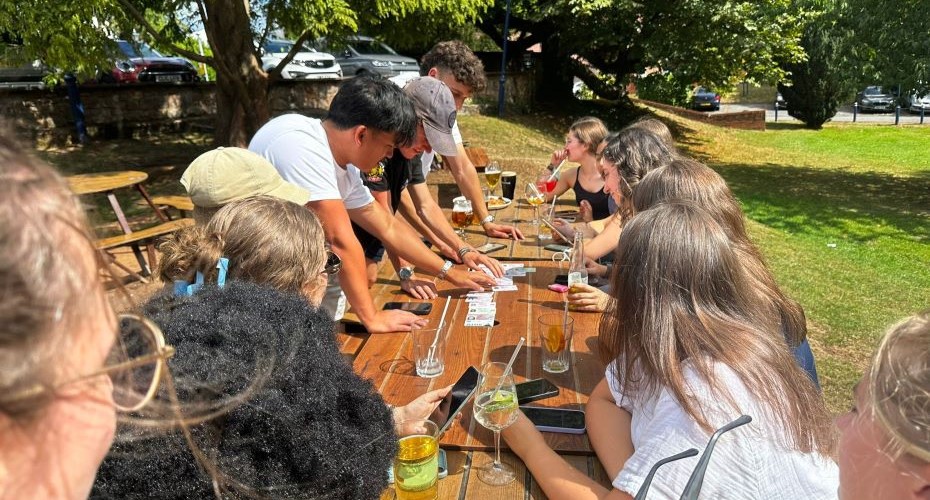
The University of Exeter welcomes students from all over the globe, which creates a richly diverse community. I found the campus so vibrant, and so many different cultural festivals are celebrated here, such as Chinese/Lunar New Year (during this time the Streatham Campus Forum holds a street party to host the celebrations) or Diwali (where there is a light procession down Forum Hill followed by fireworks on the Business School lawns). The newly opened Multifaith Centre on Streatham Campus is yet another space for those of any and no faith to come together. University is a great time to meet people from all walks of life!
Opportunities within your course
Lots of courses offer the chance to go on fieldtrips. Of course, the Geography department is no exception! On the aforementioned Cryosphere module, we visited North Devon to analyse a site that was previously a glaciated region – it was fascinating to be researching ice landforms that were quite literally on our doorstep! The Geography department specifically has a third-year field trip to various locations – from dramatic landscapes in Iceland to volcanoes in Italy. The Film department offers first years the trip of a lifetime – to the Berlin Film Festival! The cohort visits the German capital accompanied by experts in the field, such as film critic and honorary professor of the University, Mark Kermode. These are just a few personal examples of the University of Exeter’s incredible opportunities and the special connections it has.
Many courses have extended opportunities that can be built into your degree, such as study abroad or a year with industrial experience. Placements can be for either a term or for a year, which can provide some incredible opportunities to experience the workplace in a field related to your degree before graduation. For many, these placements lead to full-time employment post-graduation (and even though this is not always the case, they provide valuable experience that you can showcase on future job applications)! Some of my friends studying English spent a year out in Tampa at the University of Florida.
Others I know on the Business Economics course spent a year in London working for IBM. The opportunities are vast, and the University supports you in every step – from helping you secure a placement to providing a list of partner universities to spend a year abroad with.
Careers and Employability
The award-winning careers service here is absolutely fantastic. From personal experience, the advisors and the resources have been nothing short of outstanding – there’s a reason the careers services ranked third in the UK this year!
They can help you find part-time work whilst at university, find a placement, internship or work experience. They can advise on any stage of your career journey, from helping you work out where your degree can take you to applying to graduate jobs and schemes. They offer workshops, such as LinkedIn labs to help your profile look professional, as well as 1-1 careers guidance appointments to discuss any particular queries. They can even help you write CVs or carry out mock interviews! Some of their facilities are accessible to alumni up to three years post-graduation, and all of their online services are available for life!
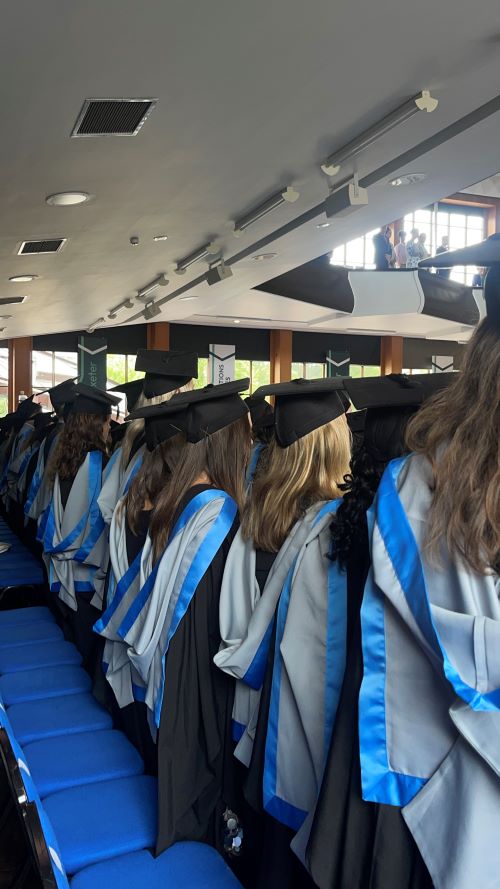
The advisors can help you get the most out of your degree and help you onto your next steps.
Taking it up a degree
There is so much to be said for a degree from the University of Exeter. Any degree at Exeter will set you up for a bright future, and every degree will demonstrate analytical, critical, and intelligent thinking. But it is what you do outside your degree that is just as – if not more – important. It is about finding what you are passionate about and providing an outlet for it. At Exeter, you’ll have more opportunities for this than you could ever imagine. As a graduate, having a degree from this institution is an honour and something I am immensely proud of. I’m so fortunate to have been given the freedom and the authority to tailor my degree to suit my interests, my learning style, and benefit my future career aspirations. You can do the same with your degree at the University of Exeter too.

